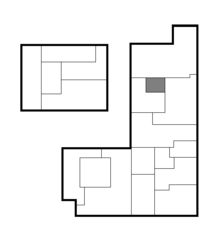More actions
imported>NFGrandTarkin Created page with "The '''November 3019 Wiltshire General Election '''will be held under the provisions of the Parliaments Act of 3019 on Friday 29 November 3019, just under three-months followi..." |
imported>NFGrandTarkin Adding categories |
||
| (One intermediate revision by the same user not shown) | |||
| Line 62: | Line 62: | ||
==== '''Wednesday December 4''' ==== | ==== '''Wednesday December 4''' ==== | ||
State Opening of Parliament; House of Commons and Senate to begin debating Governor-General's Speech vote. | State Opening of Parliament; House of Commons and Senate to begin debating Governor-General's Speech vote. | ||
[[Category:Event]] | |||
[[Category:Politics]] | |||
Latest revision as of 10:53, 11 November 2019
The November 3019 Wiltshire General Election will be held under the provisions of the Parliaments Act of 3019 on Friday 29 November 3019, just under three-months following the previous general election in September 3019. It will be the first election to the new Wiltshire Parliament.
This election will also be the first, and only, to consist of the elections to both the House of Commons and the Senate, as the Parliament Act 3019 states that the elections should be 6 months apart. The Senate, therefor, will be elected to a term of 6 months (instead of the 1 year it will be prior to the next election).
Electoral system
House of Commons
Each parliamentary constituency of Wiltshire elects one Member of Parliament (MP) to the House of Commons using the first-past-the-post voting system. This indirectly elects the government, which is formed by a party or coalition of parties that can command the confidence of a majority of MPs in the House of Commons. Both majority and minority governments are possible election outcomes as all 240 constituencies are open for election. The term of the elected MPs will be 1 year, unless the life of the first Parliament is ended prior to its natural conclusion.
Senate
Each of the 19 regions of Wiltshire will elect 2 Senators (Wiltshire Central, due to its population will elect 4), giving a total of 40 Senators, using the first-past-the-post voting system. The Senate does not form a government and so the requirement for a majority does not exist. However, the affect of not having a majority (or a plurality) of Senators could be large for the Government elected in the House of Commons.
The Senate will be elected for 6 months (in order to create the 6 month gap between House of Commons and Senate elections), after which the life of the Senate will increase to 1 year.
Voter eligibility
In order to vote in the general election, one must be;
- on the Electoral Register;
- aged 18 or over on polling day;
- a Wiltshire Citizen who is not legally excluded from voting according to law.
Individuals must be registered to vote by midnight 10 days before polling day (19 November). A person who has multiple homes is advised to pick their primary residence to register to vote - or the residence they know they will be at on polling day. Anybody unsure of their location should register for a postal ballot.
Boundaries
The 19 regions of Wiltshire were established by the Devolution and Local Governments Act of 3018 by Frank Eddington's government and these regions are used for local authority councils. Each have a relatively similar population (with the exception of Wiltshire Central) and so it was decided to use these pre-existing boundaries for the election of the Senate. In addition, these regions are split into the constituencies for the House of Commons, meaning that no constituency is in any two regions. The constituency map was drawn up by Kohl's bipartisan caretaker government.

Date of election
The date of the election was determined by the Parliament Act 3019, which states;
"The election of the House of Commons and the Senate will be held on November 29 3019 for the term of 1 year for the House of Commons and 6 months for the Senate; after the life of the first Senate, all subsequent Senates shall have a life of 1 year. The date of all future elections will be determined by the Governor-General on advice from the Government."
Once the act as passed, the local authorities began preparing for the election. Once the final boundaries were put in place, formal notification of the election of 240 MPs and 40 Senators was given to the Electoral Authority and the local Electoral Commissioners who will be responsible for the administration and results counting of the election.
Timetable
Wednesday November 6
Parliament Act 3019 passed into law.
Thursday November 7
Kohl's Caretaker Government publishes new electoral boundaries for the election to the House of Commons.
Friday November 8
Formal notification is given to the local Electoral Commissioners that an election will be held on November 29 and that all preparations need to be made for the sufficient registration of electors in all 19 regions.
Sunday November 10
All major political parties announce their primary policies and manifestos. Official campaign period begins.
Tuesday November 19
Deadline for electoral registration; Deadline for registration for postal ballots.
Monday November 25
Deadline for postal voting; any postal votes received after this date will not be counted.
Friday November 29
Polling day; polls open at 7 am and close at 7 pm.
Saturday November 30
Results will be announced for a majority of the 240 constituencies and 40 Senate elections.
Sunday December 1
First sitting of the new Parliament; the formal election of the Commons and Senate Speakers; all MPs and Senators to be sworn in ahead of State Opening of Parliament.
Wednesday December 4
State Opening of Parliament; House of Commons and Senate to begin debating Governor-General's Speech vote.
